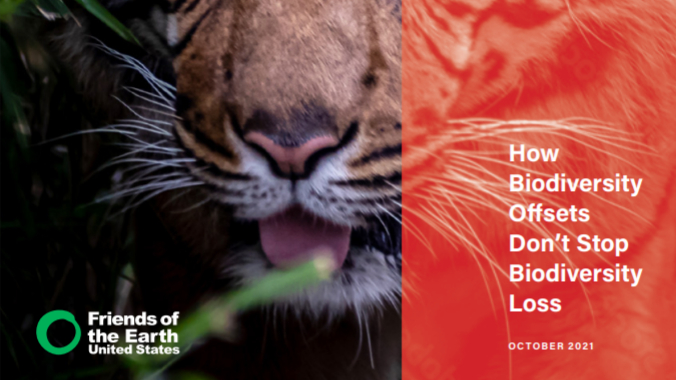Fool’s Paradise: How Biodiversity Offsets Don’t Stop Biodiversity Loss

Although increasingly recognizing their role in driving biodiversity loss, banks have yet to develop consistent, comprehensive policies and practices in ensuring that their direct and indirect financing does not cause or accelerate biodiversity loss. In an attempt to address biodiversity impacts, many banking institutions have embraced “no-net loss” or “net gain” commitments, which inherently rely on offset schemes. While biodiversity offsets may seem like a seductively simple solution to a complex problem, “Fool’s Paradise: How Biodiversity Offsets don’t Stop Biodiversity Loss”, a new briefing from Friends of the Earth US, reveals how an offset approach may actually intensify and cause more biodiversity loss by creating the illusion of biodiversity protection.
The briefing aims to inform banks about the flaws inherent in biodiversity offsetting as a concept, and the risks that result from this in the practice of applying biodiversity offsetting. By underscoring the inherent and practical flaws of biodiversity offsetting, the paper sets out the case for banks to exclude biodiversity offsetting as a means to address the negative environmental impacts of bank financed activities.
With such few, intact habitats left in the world, we need “no loss” policies, not a gamble with unproven no-net-loss approaches that allow irreversible destruction of the few remaining critical, natural and iconic habitats. In helping banks strengthen biodiversity provisions in their environmental and social frameworks, the briefing offers seven key recommendations to financiers:
- Prohibit the use of biodiversity offsets
- Emphasize the Avoid, Minimize, and Rehabilitate steps of the Mitigation Hierarchy when conditioning financing to address environmental and social risks
- Publish information regarding a client’s environmental or social obligations which are required for receiving financing, and their progress in achieving those obligations
- Publish information regarding the plans or progress of any biodiversity offset program tied to bank financing
- Ensure free, prior, informed consent in any project mitigation or conservation efforts impacting local and Indigenous communities
- Strengthen Exclusionary Lists to prohibit indirect and direct financing in or which would negatively impact natural and critical habitat and other at-risk ecosystems
- Adopt the Banks and Biodiversity Initiative’s No Go policy
Download the briefing here.
